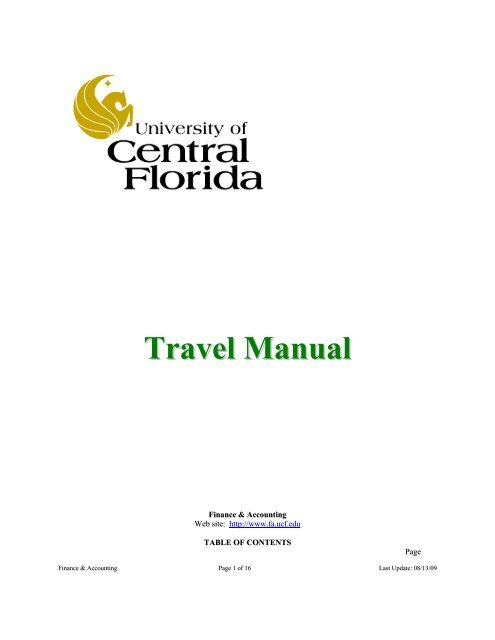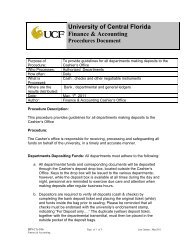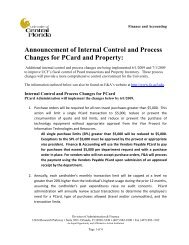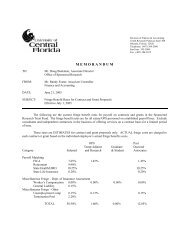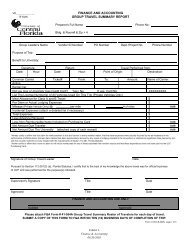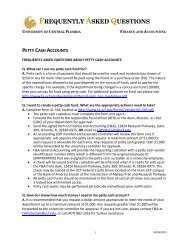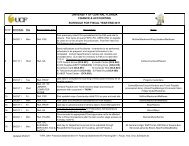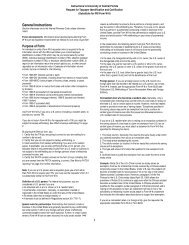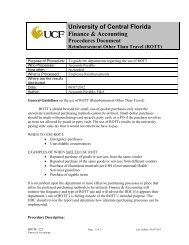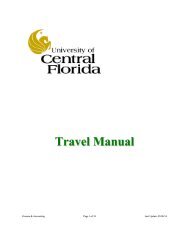Travel Manual - UCF FINANCE & ACCOUNTING - University of ...
Travel Manual - UCF FINANCE & ACCOUNTING - University of ...
Travel Manual - UCF FINANCE & ACCOUNTING - University of ...
You also want an ePaper? Increase the reach of your titles
YUMPU automatically turns print PDFs into web optimized ePapers that Google loves.
<strong>Travel</strong> <strong>Manual</strong><br />
Finance & Accounting<br />
Web site: http://www.fa.ucf.edu<br />
TABLE OF CONTENTS<br />
Page<br />
Finance & Accounting Page 1 <strong>of</strong> 16 Last Update: 08/13/09
PART A: INTRODUCTION/ TRAVEL REIMBURSEMENT SUMMARY……………………… ………3<br />
PART B:<br />
PART C:<br />
OUTLINE OF PROCEDURES ......... ........... .......... ........... ........... ........... ........... ........... ………4<br />
TRAVEL PURCHASE ORDER ....... ........... .......... ........... ........... ........... ………………………5<br />
PART D: TRAVEL ARRANGEMENTS .......... ........... .......... ........... ........... ........... ........... ........... ………6<br />
Airfare/Common Carrier………........ .......... ........... ........... ………. .......... ........... ........... 6<br />
Vehicle Rental/AVIS ........... ........... .......... ........... ........... ........... ........... ........... ........... 6<br />
Use <strong>of</strong> Rental Vehicles Provided by Other Than Avis ……… ........ ……........................... 7<br />
50-Mile Rule .. ........... ........... ........... .......... ........... ........... ........... ........... ........... ........... 8<br />
Hotel Accommodations ......... ........... .......... ........... ........... ........... ……… ........... …… ... 8<br />
Conferences and Conventions ........... .......... ........... ........... ……………... ………… ...... 8<br />
Registrations Fees ...... ........... ........... .......... ........... ……………... …………….. ........... 8<br />
PART E: TRAVEL ADVANCES ......... ........... ........... .......... ........... ........... ........... ........... ........... …… ... 8<br />
PART F:<br />
VOUCHER FOR REIMBURSEMENT OF TRAVEL EXPENSES "REIMBURSEMENT<br />
VOUCHER" .. ........... ........... ........... .......... ........... ........... ........... ........... ........... ........... 9<br />
PART G: PER DIEM AND MEAL ALLOWANCES .. .......... ........... ........... ........... ........... ........... ........... 11<br />
PART H: USE OF PERSONAL VEHICLE…… .......... .......... ........... ........... ........... ........... ........... ........... 12<br />
PART I: OTHER INCIDENTAL TRAVELING EXPENSES ........... ........... ........... ........... ........... ........... 13<br />
PART J: PERSONAL TRAVEL ..... .......... ........... .......... ........... ........... ........... ........... ........... ........... 14<br />
PART K: TRAVEL UNDER SPECIAL CIRCUMSTANCES ........... ........... ........... ........... ........... ........... 14<br />
PART L: FOREIGN TRAVEL ........... ........... ........... .......... ........... ........... ........... ........... ........... ........... 14<br />
PART M: GROUP TRAVEL PROCEDURES .. ........... .......... ........... ........... ........... ........... ........... ........... 16<br />
PART N: MISCELLANEOUS……………………………………………………………………………. ..... 16<br />
EXHIBITS – to view the exhibits, go to: http://www.fa.ucf.edu click on <strong>Travel</strong> ><strong>Travel</strong> <strong>Manual</strong> >Exhibit<br />
PART A<br />
Finance & Accounting Page 2 <strong>of</strong> 16 Last Update: 08/13/09
INTRODUCTION<br />
This travel manual has been prepared to familiarize university employees with the travel provisions <strong>of</strong> Florida<br />
Statute 112.061, the Florida Administrative Code and the policies <strong>of</strong> the <strong>University</strong> <strong>of</strong> Central Florida. It is the<br />
responsibility <strong>of</strong> the department to inform all travelers (employee and non-employee) who will seek reimbursement<br />
from the university <strong>of</strong> the various travel requirements.<br />
All facets <strong>of</strong> travel are to be by the most efficient and economical means. <strong>Travel</strong> reimbursement vouchers are<br />
processed by Finance and Accounting (F&A) in compliance with Florida laws and the policies and procedures <strong>of</strong> the<br />
<strong>University</strong> <strong>of</strong> Central Florida. Additional documentation and/or justification may be required to support<br />
reimbursement <strong>of</strong> expenses claimed. F&A may make positive or negative adjustments to reimbursement requests, as<br />
necessary, to comply with the applicable statutes, policies, and procedures.<br />
If the receipts described in the manual are unavailable, other forms <strong>of</strong> back-up may be permissible with justification<br />
so that reimbursement <strong>of</strong> the expense can still take place. F &A will make all reasonable efforts to approve<br />
reimbursement to the traveler.<br />
TRAVEL REIMBURSEMENT SUMMARY<br />
TRAVEL AUTHORIZATION<br />
• All travel should be approved by the traveler’s supervisor (and the principal investigator for projects)<br />
before any expenses are incurred.<br />
• The travel purchase order should be completed in the traveler’s name or that <strong>of</strong> the group leader if group<br />
travel is involved.<br />
30-DAY RULE (see exhibit M for sample memo)<br />
• Employee travel for more than 30 days to a single location requires provost approval.<br />
50-MILE RULE<br />
• An overnight stay within 50 miles <strong>of</strong> the traveler’s headquarters or home (whichever is closer to the<br />
destination) cannot be reimbursed without the written approval <strong>of</strong> the provost.<br />
AIRFARE<br />
• Airline tickets should be economy or coach class, including all reasonable costs associated with economy<br />
and coach class, and a paid receipt should be submitted.<br />
• A traveler is allowed up to three hours before a flight as travel time to the airport and up to two hours after<br />
a flight as travel time home for both domestic and foreign travel.<br />
• <strong>UCF</strong> business should begin the day <strong>of</strong> or the day after the traveler arrives at his or her destination. The<br />
traveler should return to headquarters the day <strong>of</strong> or the day after business ends.<br />
• If a flight change occurs, the original itinerary and the revised itinerary should be submitted to F&A to<br />
support any change fees or monetary changes in airfare.<br />
TRAVEL ADVANCES<br />
• <strong>Travel</strong> advances can be obtained by employees to cover 80% <strong>of</strong> their meals and lodging cost for a trip over<br />
5 days in length, if needed.<br />
• Reimbursement for a trip that included a travel advance is required by Florida Statute to be submitted<br />
within 10 business days after completion <strong>of</strong> the trip.<br />
MEALS<br />
• Meals are paid at the following rates: Breakfast $6, Lunch $11, and Dinner $19 (no receipts are required).<br />
In order to be paid meals, the trip has to be an overnight trip or longer. Day trip meals are not reimbursed.<br />
HOTELS<br />
• Hotel rooms should be paid at the single room rate and should have an itemized bill showing payment to be<br />
reimbursed. Room rates should be reasonable for the area <strong>of</strong> the country in which the traveler is visiting.<br />
• Normally, a limit <strong>of</strong> $200 per night applies to cities in the United States, unless a conference hotel is used.<br />
Foreign per diem rates apply to hotels in foreign cities.<br />
http://aoprals.state.gov/content.asp?content_id=184&menu_id=78<br />
PER DIEM<br />
• For domestic travel, in lieu <strong>of</strong> meals and lodging, a traveler may be paid a straight per diem rate <strong>of</strong> $80.00<br />
Finance & Accounting Page 3 <strong>of</strong> 16 Last Update: 08/13/09
for the day with no receipts.<br />
GROUND TRANSPORTATION<br />
• Rental cars should be obtained through the <strong>UCF</strong> Avis contract. A compact car should be rented unless a<br />
justification for a larger car is sent in with the reimbursement.<br />
• Mileage is paid at the rate <strong>of</strong> $0.445 cents a mile when the traveler’s personal vehicle is used. If the traveler<br />
chooses to drive, the amount <strong>of</strong> mileage reimbursement will be limited to the amount it would have cost to<br />
fly.<br />
• If a family member drives the traveler to the airport in the traveler’s personal vehicle, round-trip mileage<br />
and tolls from the traveler’s home to the airport is permissible.<br />
INCIDENTAL EXPENSES<br />
• Taxi, toll, , and parking over $25.00 per occurrence require a receipt.<br />
• Tips for taxis will be reimbursed at a rate <strong>of</strong> 15% <strong>of</strong> the cost <strong>of</strong> the taxi ride.<br />
• Baggage tips for skycaps and bellman can be reimbursed at a rate <strong>of</strong> $1.00 per bag, up to 5 bags.<br />
CONFERENCES/SYMPOSIUMS<br />
• Registrations that include additional events may be allowable with an explanation as to why it was<br />
beneficial to the university for the traveler to attend.<br />
• A traveler attending a conference should send in the following items with his or her reimbursement request:<br />
a registration form; a receipt showing payment <strong>of</strong> the registration; and the agenda or conference<br />
information showing where the conference is taking place, the days <strong>of</strong> the conference, and what is included<br />
in the cost <strong>of</strong> the registration.<br />
• The traveler cannot claim meals or lodging included in the registration fee.<br />
NON-ALLOWABLE ITEMS<br />
• Items that are not reimbursable:<br />
‣ Personal travel insurance<br />
‣ Rental car insurance options (if other than Avis is used, traveler should get Collision<br />
Damage Waiver insurance (CDW))<br />
‣ Personal telephone calls and non-business Internet service<br />
‣ Personal expenses<br />
‣ Gas for traveler’s personal vehicle (covered by mileage reimbursement)<br />
‣ <strong>Travel</strong> costs between home and <strong>of</strong>ficial place <strong>of</strong> work<br />
‣ Fines for parking or traffic violations<br />
‣ Room service<br />
‣ Movie rentals<br />
‣ Alcoholic beverages<br />
‣ Loss or damage to personal items<br />
‣ Tips to hotel cleaning staff<br />
‣ <strong>Travel</strong> to countries deemed a State Sponsor <strong>of</strong> Terrorism (for a list <strong>of</strong> countries, see<br />
http://www.state.gov/s/ct/c14151.htm)<br />
PART B<br />
OUTLINE OF PROCEDURES<br />
The following is an outline <strong>of</strong> steps that should be followed in preparation for a trip and subsequent reimbursement<br />
<strong>of</strong> travel expenses.<br />
1. Make sure to obtain provost approval for employee travel more than 30 days to a single location or travel within<br />
50 miles <strong>of</strong> headquarters prior to initiating the travel requisition. (See exhibit M for sample memo)<br />
2. Prepare a requisition for a travel purchase order utilizing the <strong>UCF</strong> Financials/PeopleS<strong>of</strong>t online requisition<br />
process. See either Exhibit A for a flowchart on initiating a travel requisition or Addy Notes on the F&A Web<br />
site (http://www.fa.ucf.edu).<br />
3. Purchase airline tickets and make lodging reservations (if applicable).<br />
Finance & Accounting Page 4 <strong>of</strong> 16 Last Update: 08/13/09
4. Prepare an Invoice/Payment Transmittal, Form 41-909, for advance payment <strong>of</strong> registration fees (if applicable).<br />
5. Prepare a travel advance (if travel is more than five days and when authorized).<br />
6. Reserve a rental vehicle from AVIS (if applicable).<br />
7. If a Voyager gasoline credit card will be needed (these cards are for use only with <strong>UCF</strong> vehicles), an authorized<br />
employee should go to http://www.fa.ucf.edu/Forms/<strong>Travel</strong>/41-963.pdf and fill out the Voyager request form.<br />
Once the form is completed, send the original to Albert (Bert) Francis in F&A. It usually takes from five to<br />
seven working days for the card to be received in F&A from Voyager. You will be notified when the card is<br />
available to be picked up at the travel <strong>of</strong>fice. Each card is assigned to a specific university vehicle and should be<br />
used only for that vehicle. It is to be used to purchase gasoline only at facilities that accept Fleet credit cards.<br />
Most large station chains accept Fleet cards.<br />
8. Once travel is completed, prepare the Voucher for Reimbursement <strong>of</strong> <strong>Travel</strong>ing Expenses (Reimbursement<br />
Voucher).<br />
9. Submit Reimbursement Voucher and supporting documents/receipts to F&A, <strong>Travel</strong> Section, for processing.<br />
PART C<br />
TRAVEL PURCHASE ORDER<br />
1. DEFINITION. The <strong>Travel</strong> Purchase Order is the university’s formal document for approval to incur travel<br />
expenses. Prepare a requisition for a <strong>Travel</strong> Purchase Order utilizing the <strong>UCF</strong> Financials/PeopleS<strong>of</strong>t Online<br />
requisition process. The <strong>Travel</strong> Purchase Order should be made payable to the traveler. All anticipated costs<br />
associated with the travel should be included in the amount requested. A <strong>Travel</strong> Purchase Order is not required<br />
if there will be no expense to the university. The use <strong>of</strong> more than one department/project is permissible for an<br />
individual trip PO or a group PO, but there should be only one <strong>Travel</strong> Purchase Order per trip. The department<br />
is required to certify at the time the requisition is created that the supervisor’s approval (and the principal<br />
investigator for projects) for the trip has been obtained.<br />
2. TIME OF REQUEST. Purchase Orders not obtained on or before the travel date commences should include<br />
justification as to why the request is after the fact.<br />
3. THREE TYPES OF TRAVEL PURCHASE ORDERS.<br />
a. Blanket purchase order. A blanket purchase order may be set up when an employee performs<br />
numerous trips to the same destination or for vicinity travel in the State <strong>of</strong> Florida. A blanket purchase<br />
order may be set up for a fiscal year or shorter period; however, all blanket POs will expire at the end<br />
<strong>of</strong> the fiscal year (June 30) or, in the case <strong>of</strong> grants/projects, on the date that is specified. A blanket<br />
travel purchase order should be for a minimum <strong>of</strong> $100.00 and should be assigned to a single<br />
department/project number.<br />
b. Individual trip purchase order. An individual trip purchase order is for a one-time trip for one<br />
individual. A trip consists <strong>of</strong> travel from headquarters to destination(s) and return to headquarters.<br />
c. Group purchase order. A group purchase order will cover a one-time trip for two or more individuals<br />
traveling at the same time to and from the same location for the same purpose.<br />
4. TRAVEL CATEGORY CODES<br />
TRAVEL CATEGORY CODES. Category codes should be entered for each line <strong>of</strong> the travel requisition and<br />
should match the expense type.<br />
Finance & Accounting Page 5 <strong>of</strong> 16 Last Update: 08/13/09
Category Code<br />
Description<br />
99007001 Registration<br />
99007002 Airfare<br />
99007003 Hotel<br />
99007004 <strong>Travel</strong> Advance<br />
99007005 Meals<br />
99007006 Per Diem<br />
99007007 Mileage<br />
99007008 Car Rental<br />
99007009 Parking<br />
99007010 Taxi/Tolls/Shuttle<br />
99007011 Business Commun./Internet<br />
99007012 Training Matl./Exhibit Matl./Presentation Matl.<br />
99007013 Passport/Visa/Immunizations/Conversion Fees<br />
5. ENCUMBRANCE. The system will encumber (or hold) the amount <strong>of</strong> the PO to ensure availability <strong>of</strong> funds for<br />
reimbursement <strong>of</strong> expenses incurred. If the PO is no longer required, an e-mail should be sent to the travel<br />
payable processor to close it. Any monies not spent will revert to the respective department/project.<br />
6. CHANGE ORDER. If money needs to be added to a blanket travel PO or if an expense type or an additional<br />
department or project number needs to be added to any type <strong>of</strong> travel PO, a change order should be initiated by<br />
the department. In the description field <strong>of</strong> the new requisition, please note “Change Order to PO number (the<br />
number <strong>of</strong> the PO that money will be added to).” A change order to an already closed PO is not possible. The<br />
travel payable processor may add a line to the voucher to expedite payment rather than delay the travel<br />
reimbursement process.<br />
PART D<br />
TRAVEL ARRANGEMENTS<br />
1. AIRFARE/COMMON CARRIER. Airline tickets can be obtained by contacting the airline directly, using the<br />
airline Web site or by utilizing one <strong>of</strong> the many travel Web sites such as expedia.com, travelocity.com,<br />
cheaptickets.com, and orbitz.com. Airline tickets should be economy or coach class tickets.<br />
Reservations. The department/traveler should verify the information on the airline ticket and itinerary to make<br />
sure that dates, cities, times, and other relevant information is correct.<br />
Upgraded Airline Tickets. <strong>Travel</strong>ers preferring to secure upgraded accommodations should pay the difference<br />
between the non-refundable economy/coach rate and the upgraded rate. The cost <strong>of</strong> an upgraded ticket cannot<br />
be reimbursed unless justified in detail and approved by F&A.<br />
Changing or Canceling Airline Tickets. Once a ticket has been purchased using university funds, it is the<br />
responsibility <strong>of</strong> the department/traveler to check with the airline for its policy on changing travel dates or<br />
canceling the ticket. Any cost incurred to <strong>UCF</strong> for changes to an airline ticket should be justified. If a trip is<br />
canceled, the traveler is to return all unused airline tickets purchased by <strong>UCF</strong> to the department with a<br />
memorandum explaining the cancellation <strong>of</strong> the trip. The traveler should submit both the original and revised<br />
ticket itineraries and receipts with the reimbursement request.<br />
Receipts. A copy <strong>of</strong> the airline ticket itinerary giving dates and times <strong>of</strong> arrival and departure as well as a<br />
receipt showing payment should be attached to the reimbursement voucher sent to F&A.<br />
2. VEHICLE RENTAL/AVIS<br />
VEHICLE RENTAL/AVIS. The State <strong>of</strong> Florida has a contract with AVIS, and AVIS should be the rental<br />
agency <strong>of</strong> first choice. This contract is only applicable for renting from AVIS in the continental U.S. SUVs and<br />
12-15 passenger vans are not part <strong>of</strong> our contract, but they may be used under limited circumstances with<br />
sufficient justification from the department.<br />
Finance & Accounting Page 6 <strong>of</strong> 16 Last Update: 08/13/09
IMPORTANT NOTE REGARDING AGE: When renting from AVIS, if the driver <strong>of</strong> the vehicle is under 25<br />
years <strong>of</strong> age, that person (per <strong>UCF</strong>’s contract with Avis) must be the renter and the rental is required to be paid<br />
for with a <strong>UCF</strong> PCard. An individual 25 years <strong>of</strong> age and over can be an additional driver, but an individual<br />
under 25 years <strong>of</strong> age cannot be an additional driver.<br />
Reservations. When making a reservation, specifically request for the State <strong>of</strong> Florida contract rates by using<br />
AWD number A113400 or <strong>UCF</strong> AWD number B113400. To assure class B vehicles are reserved, the request<br />
should be by vehicle class rather than vehicle make and model.<br />
Avis Wizard Number. To have an AVIS Wizard number assigned to a <strong>UCF</strong> PCard, e-mail the request to<br />
TRAVELFA@mail.ucf.edu and furnish the complete name <strong>of</strong> the PCard holder. Do not give the PCard number.<br />
A department’s <strong>UCF</strong> PCard holder, by using the AVIS Wizard number assigned to the card, can make a<br />
reservation for an employee traveler who does not have a PCard and for a non-<strong>UCF</strong> employee traveler as well.<br />
Avis Vehicle Classes. Under normal travel conditions, the vehicle sizes listed below should be used. If there is<br />
a deviation from the size chart, a justification should be submitted with the reimbursement voucher. <strong>University</strong><br />
regulations do permit exceptions for medical reasons (on a case-by-case basis). A memorandum <strong>of</strong> approval<br />
from the <strong>UCF</strong> Equal Opportunity & Affirmative Action <strong>of</strong>fice should be attached to the RV.<br />
VEHICLE CLASSES:<br />
AVIS VEHICLE CLASS CODE:<br />
Subcompact 1(A) 1 – 2 travelers ECAR<br />
Compact 2(B) 1 – 2 travelers CDAR<br />
Intermediate 3(C) 3 – 4 travelers IDAR<br />
Full 4(E) 5 travelers FDAR<br />
Mini Van 5(V) 5 – 7 travelers MVAN<br />
Regular Van (P) 8 + travelers<br />
SUVs and 12-15 passenger vans are not part <strong>of</strong> our contract. You are highly encouraged to contact Risk<br />
Management (3-6300) before renting a vehicle <strong>of</strong> this size.<br />
Reservations: 1-800-338-8211, Web site: Avis.com, Request State <strong>of</strong> Florida rates<br />
Reference number: State <strong>of</strong> Florida AWD number A113400 or <strong>UCF</strong> AWD number B113400<br />
Account Service Representative: Dianna Dinkins, 1-800-525-7521 Ext. 1149<br />
Avis State <strong>of</strong> Florida Contract number: 518-020-05-1; for car rental rates, go to http://www.fa.ucf.edu click on<br />
<strong>Travel</strong>>Useful Links>AVIS Rental Vehicle Contract.<br />
Collision Damage Waiver (CDW). A traveler may not be reimbursed for accepting CDW when using the State<br />
<strong>of</strong> Florida contract, as this coverage is included in the contract. When circumstances require use <strong>of</strong> another<br />
vehicle rental agency, CDW should be accepted if this coverage is not included in the rental agreement.<br />
The State <strong>of</strong> Florida AVIS contract is not applicable for Out-<strong>of</strong>-Country, Alaska, and Hawaii rentals. When<br />
renting from AVIS in other than the continental U.S., the traveler should accept CDW, if available.<br />
Personal Accident Insurance (PAI)/Additional Liability Insurance (ALI). A traveler cannot be reimbursed for<br />
this coverage.<br />
Accidents. The rental contract includes 100% coverage for all collision damage to vehicles. Promptly take the<br />
following action concerning vehicle accidents:<br />
(a) Report accident to rental vendor<br />
(b) Obtain police report<br />
(c) Advise the traveler’s <strong>UCF</strong> department, who then should advise <strong>UCF</strong> Risk Management (407-823-<br />
0146)<br />
(d) If a <strong>UCF</strong> employee is injured, contact Human Resources (407-823-2771)<br />
3. USE OF RENTAL VEHICLES PROVIDED BY OTHER THAN AVIS WHEN RENTING IN THE<br />
CONTINENTAL U.S. This contract does not prohibit the use <strong>of</strong> rental vehicles that have lower net rates,<br />
Finance & Accounting Page 7 <strong>of</strong> 16 Last Update: 08/13/09
inclusive <strong>of</strong> primary insurance coverage. Insurance should be purchased when vehicles are rented from<br />
companies other than Avis.<br />
When Avis cannot provide vehicles, or when due to travel time or distance to the nearest Avis location, it is not<br />
cost effective and/or practical to use vehicles from Avis, another agency can be used. <strong>UCF</strong> requires justification<br />
if other than Avis is used.<br />
4. THE 50-MILE RULE. A traveler may not claim reimbursement for meals or lodging for overnight travel within<br />
50 miles <strong>of</strong> the traveler’s headquarters or residence, whichever is closer to the traveler’s destination, unless<br />
approved by the provost.<br />
5. HOTEL ACCOMMODATIONS. Lodging expenses qualify for reimbursement at a single-occupancy rate and<br />
should be substantiated by itemized paid receipts. Lodging rates should be reasonable for the area <strong>of</strong> the country<br />
in which the travel occurs. A traveler may not be paid for more than one lodging expense per night, unless fully<br />
justified. Normally, a limit <strong>of</strong> $200 per night applies to cities in the United States, unless a conference hotel is<br />
used. Foreign per diem rates apply to hotels in foreign cities.<br />
http://aoprals.state.gov/content.asp?content_id=184&menu_id=78<br />
6. CONFERENCES AND CONVENTIONS. A traveler attending a conference should send in with his or her<br />
reimbursement request the following: a registration form, a receipt showing payment <strong>of</strong> the registration, and the<br />
agenda or conference information showing where the conference is taking place, the days <strong>of</strong> the conference, and<br />
what is included in the cost <strong>of</strong> the registration.<br />
7. REGISTRATION FEES. An advanced payment <strong>of</strong> a registration fee to attend a conference, convention, or any<br />
other event is frequently required prior to the date <strong>of</strong> the event. An approved PO is needed before an advance<br />
payment can be made by F&A via a university check or by university PCard. The department needs to submit<br />
the following documents to the <strong>Travel</strong> Section at least three weeks prior to the due date for the registration fee<br />
to be paid by check:<br />
• A completed and signed Invoice Transmittal, Form 41-909<br />
• A completed registration form, including the fee schedule<br />
If paid by the traveler, the cost <strong>of</strong> the registration should be included on the travel reimbursement voucher under<br />
the incidental expenses column.<br />
The traveler cannot claim meals and/or lodging expenses included in the registration fee.<br />
The cost <strong>of</strong> a meal function or special event not included in the registration fee may be reimbursed if<br />
justification for attending is provided.<br />
If a registration fee is not paid by <strong>UCF</strong>, a receipt is not required, but a copy <strong>of</strong> the agenda and general<br />
information about the conference should be provided.<br />
PART E<br />
TRAVEL ADVANCES<br />
1. GENERAL. Only <strong>UCF</strong> employees may request a travel advance.<br />
2. ADVANCES. The following are required in order to process a travel advance:<br />
• The travel should be for a duration <strong>of</strong> five days or more.<br />
• A travel advance cannot exceed 80 percent <strong>of</strong> the estimated meals and lodging expenses that will ultimately<br />
be reimbursed to the traveler.<br />
• A traveler may not have more than one travel advance outstanding at any time.<br />
Finance & Accounting Page 8 <strong>of</strong> 16 Last Update: 08/13/09
• <strong>Travel</strong>er and/or Departmental Responsibilities:<br />
a. The travel PO and Application for Advance on <strong>Travel</strong> Expense, Form 41-552, should be submitted<br />
to <strong>Travel</strong> Payables 21 days in advance <strong>of</strong> the departure date in order to ensure sufficient processing<br />
time.<br />
b. A reimbursement voucher is required to be completed within ten working days after the trip ending<br />
date.<br />
c. If the advanced funds are in excess <strong>of</strong> the actual reimbursement due the traveler, the excess should<br />
be deposited at the Cashier's Office (Millican Hall, Room 111) within ten working days <strong>of</strong> the trip<br />
ending date.<br />
d. A copy <strong>of</strong> the Cashier’s Office documentation and a copy <strong>of</strong> the Form 41-552 should be attached to<br />
the reimbursement voucher.<br />
PART F<br />
VOUCHER FOR REIMBURSEMENT OF TRAVELING EXPENSES<br />
"REIMBURSEMENT VOUCHER"<br />
1. GENERAL. The Voucher for Reimbursement <strong>of</strong> <strong>Travel</strong>ing Expenses (Form 41-901), commonly referred to as<br />
"Reimbursement Voucher" or “RV,” is the university’s <strong>of</strong>ficial document used to reimburse travelers for<br />
expenses incurred while on <strong>of</strong>ficial travel. The reimbursement voucher should include original receipts (copies,<br />
if paid by <strong>UCF</strong> PCard) for lodging, vehicle rentals, airline ticket, incidental expenses, and a copy <strong>of</strong> the<br />
conference agenda that shows dates and the activities.<br />
2. INSTRUCTIONS FOR PREPARATION OF REIMBURSEMENT VOUCHER. The following are specific<br />
instructions for completion <strong>of</strong> the reimbursement voucher. See Exhibits D, E, and F <strong>of</strong> the <strong>Travel</strong> <strong>Manual</strong>.<br />
Vendor - Complete name <strong>of</strong> the traveler.<br />
Vendor ID number - Vendor ID number <strong>of</strong> the traveler (For employees, this is EMP followed by the employee’s<br />
ID number).<br />
Headquarters – For employees, this is the city/campus in which the traveler's assigned <strong>of</strong>fice or place <strong>of</strong> work is<br />
located. If the traveler is stationed in another city for a period <strong>of</strong> 30 continuous workdays or more, such city will<br />
become the <strong>of</strong>ficial headquarters and the traveler will not be allowed to receive further per diem or subsistence<br />
unless specifically approved by the provost. For non-employees, their headquarters is their city/state <strong>of</strong><br />
residence.<br />
Is <strong>Travel</strong>er a U.S. Citizen? Mark yes or no as to the status <strong>of</strong> the traveler’s US citizenship.<br />
Prepared by - Name <strong>of</strong> individual preparing this form.<br />
Phone number - Complete phone number <strong>of</strong> the preparer.<br />
Bldg. & Rm - The building name and the room number (not the building number).<br />
Campus +4 zip - Campus location (example, Main 2210, Daytona 0800).<br />
Check One – Identify if the traveler is an employee or non-employee during the time period <strong>of</strong> this travel?<br />
PO number - The travel purchase order number issued by F&A through the online requisition.<br />
Dept./Project number. - Department or Project number(s) to which the travel expenses will be charged.<br />
Residence (City, State) - The home city and state <strong>of</strong> the traveler.<br />
Finance & Accounting Page 9 <strong>of</strong> 16 Last Update: 08/13/09
Date - Enter the date, including the year, on a separate line for each day that the traveler is away.<br />
<strong>Travel</strong> performed from point <strong>of</strong> origin to destination - The first line will show the city and state where the travel<br />
originated to the traveler's destination. Show the traveler's location each day. The last line will show the city and<br />
state where the traveler ended the trip. For example, if a traveler whose headquarters is <strong>UCF</strong> Main Campus<br />
spends three days in Norfolk, VA, and two days in San Diego, CA, starting January 1, this column (and date <strong>of</strong><br />
column) will look as follows:<br />
1/1/2008 <strong>UCF</strong> Main Campus (Orlando, FL) to Norfolk, VA<br />
1/2/2008 Norfolk, VA<br />
1/3/2008 Norfolk, VA to San Diego, CA<br />
1/4/2008 San Diego, CA<br />
1/5/2008 San Diego, CA to <strong>UCF</strong> Main Campus (Orlando, FL)<br />
Purpose or reason - Indicate the specific purpose <strong>of</strong> the travel. The name <strong>of</strong> organizations, conferences, or<br />
conventions should be provided in full. Do not abbreviate.<br />
Hour <strong>of</strong> departure- The time <strong>of</strong> day or night the traveler leaves his/her headquarters to commence travel. When<br />
traveling by air, the university allows up to three hours prior to scheduled departure time for travel to the<br />
airport.<br />
Hour <strong>of</strong> return – The time <strong>of</strong> the day or night the traveler arrives back at his/her headquarters to end travel.<br />
When traveling by air, the university allows up to two hours after the scheduled landing time for travel from the<br />
airport.<br />
Meals – In order to qualify for meal reimbursement, travel should be for an overnight or longer stay to a<br />
location over 50 miles from headquarters. See PART G <strong>of</strong> the <strong>Travel</strong> <strong>Manual</strong>: PER DIEM AND MEAL<br />
ALLOWANCES.<br />
Per Diem or actual lodging expense - If claiming the $80 per diem rate, enter the full amount <strong>of</strong> $80 or fraction<br />
there<strong>of</strong> as shown in PART G <strong>of</strong> the <strong>Travel</strong> <strong>Manual</strong>. If claiming meals plus lodging, enter the amount <strong>of</strong> lodging<br />
for each day.<br />
Map mileage claimed – Mileage between cities may be obtained from the Internet using a Web site<br />
(http://www.mapquest.com/<br />
http://www.mapquest.com/) taken from the odometer <strong>of</strong> the personal vehicle used or taken from the mileage<br />
chart in the travel manual (see Exhibit H). Round mileage for each day to the nearest whole number. Enter the<br />
total number <strong>of</strong> miles at the bottom <strong>of</strong> the column. Multiply the total number <strong>of</strong> miles by the mileage allowance<br />
($0.445). When the traveler is riding with someone else or using a university-owned vehicle, the traveler is not<br />
entitled to a mileage allowance. A traveler will not be reimbursed for mileage or other transportation expenses<br />
when the cost <strong>of</strong> the trip is paid by another source. All travel should be by a usually traveled route.<br />
Vicinity mileage claimed – Use this section for mileage to a secondary destination(s) after reaching the primary<br />
destination. Example, traveler went from Orlando to Tampa (this mileage is considered map mileage). Mileage<br />
while in the Tampa area on <strong>UCF</strong> business would be considered vicinity miles.<br />
Other expenses - Enter incidental expenses paid by the traveler with personal funds. This column should include<br />
expenses such as taxi fares, parking, porter fees, tolls, etc. and the cost <strong>of</strong> airfare and vehicle rental. Identify<br />
incidental expenses separately. For additional information about required receipts and reimbursable expenses,<br />
see PART I <strong>of</strong> the <strong>Travel</strong> <strong>Manual</strong>.<br />
Summary total - Add up each column separately and enter the sum <strong>of</strong> the columns for Meals, Per Diem or<br />
Actual Lodging Expenses, Map Mileage Claimed, Vicinity Mileage Claimed, and Other Expenses.<br />
Less advance received - If a travel advance was paid to the traveler, enter the amount <strong>of</strong> the advance.<br />
Finance & Accounting Page 10 <strong>of</strong> 16 Last Update: 08/13/09
Less adjustments - Enter the total amount <strong>of</strong> any necessary adjustments resulting from non-reimbursable<br />
expenses paid using the <strong>UCF</strong> PCard.<br />
Net Amount due the traveler - Subtract the amounts entered on the "Less Advance Received” and “Less<br />
Adjustments” lines from the Summary Total and if a positive amount, enter it here. This is the amount that<br />
<strong>UCF</strong> will reimburse the traveler.<br />
Net Amount due university - Subtract the amounts entered on the “Less Advance Received” and “Less<br />
Adjustments” lines from the Summary Total and if a negative amount, enter it here. This is the amount that the<br />
traveler owes <strong>UCF</strong> and is to be deposited at the Cashier’s Office. Provide the Cashier’s Office with the<br />
Dept./Project number and the six-digit travel expense account code. Submit a copy <strong>of</strong> the deposit document<br />
with the reimbursement voucher.<br />
Statement <strong>of</strong> benefit to <strong>UCF</strong> - Enter how the university is benefited by this trip. Do not leave this blank. This is<br />
not the same as the purpose <strong>of</strong> the travel.<br />
<strong>Travel</strong>er signature/title/date - Enter the traveler's title. The reimbursement voucher should show the traveler's<br />
original signature. Date shown should be the date the reimbursement voucher was signed by the traveler.<br />
Supervisor signature/title/date - The reimbursement voucher should show the supervisor's original signature,<br />
title, and date signed.<br />
<strong>Travel</strong> performed by common carrier or <strong>UCF</strong> vehicle - Include in this section date <strong>of</strong> travel, the airline ticket<br />
number, cities traveled from and to, cost <strong>of</strong> airline ticket, and airline company (abbreviate, if necessary). Also<br />
include here the same data for vehicle rentals. If traveler paid for the airfare or the vehicle rental, omit the<br />
amount. In those instances, the amount is shown in the "Other Expenses" column. If using a university-owned<br />
vehicle, include the vehicle tag number.<br />
3. SPECIAL TYPES OF REIMBURSEMENT VOUCHERS<br />
COMP VOUCHER. A reimbursement voucher is not required when all expenses are paid using the university<br />
PCard.<br />
SUPPLEMENTAL VOUCHER. If it is discovered, after a reimbursement voucher has been paid, that an item<br />
or items <strong>of</strong> reimbursement were omitted, a supplemental voucher may be submitted as follows:<br />
(1) Write the words "SUPPLEMENTAL VOUCHER" across the top <strong>of</strong> the voucher.<br />
(2) Prepare a supplemental voucher with all the basic information as the original voucher. In the<br />
monetary columns, list only the charges that were not originally paid.<br />
(3) Attach one copy <strong>of</strong> the original voucher marked "For Reference Only."<br />
PART G<br />
PER DIEM AND MEAL ALLOWANCES<br />
In order to be paid meals or per diem, the trip should be an overnight trip or longer. Day trip meals are not<br />
reimbursed. The following are steps to compute the per diem or meal allowance:<br />
SELECT THE PREFERRED METHOD OF PAYMENT<br />
• Meal Allowance Plus Cost <strong>of</strong> Lodging. . Maximum meal allowance <strong>of</strong> $36 per day, where applicable, plus<br />
the cost <strong>of</strong> lodging (including tax). Lodging receipts are required. Meal receipts are not required.<br />
• Straight Per Diem. . The traveler receives an $80 flat rate per day to cover the cost <strong>of</strong> lodging and meals.<br />
Lodging receipts are not required. Per Diem is the subsistence allowance that a traveler is authorized to<br />
receive when traveling on <strong>of</strong>ficial business within the United States or Puerto Rico. Per Diem is paid based<br />
on 4 quarters <strong>of</strong> a day, $20 for each quarter. The quarter periods used are midnight to 6 a.m., 6 a.m. to<br />
noon, noon to 6 p.m., and 6 p.m. to midnight. Any time between the times listed are paid at the rate for the<br />
period which they fall within. Example: 8 am would be paid using the 6 am to 12 noon time period amount.<br />
Finance & Accounting Page 11 <strong>of</strong> 16 Last Update: 08/13/09
Meal Allowance The meal allowance is used to reimburse travelers who claim the actual cost <strong>of</strong> lodging plus the<br />
meal allowance. The allowance is based on the following schedules.<br />
a. The day <strong>of</strong> departure:<br />
Breakfast: When travel begins BEFORE 6 a.m.<br />
Lunch: When travel begins BEFORE 12 Noon<br />
Dinner: When travel begins BEFORE 6 p.m.<br />
a. The day <strong>of</strong> return:<br />
Breakfast: When travel ends AFTER 8 a.m.<br />
Lunch: When travel ends AFTER 2 p.m.<br />
Dinner: When travel ends AFTER 8 p.m.<br />
b. <strong>Travel</strong>ers receiving the meal allowance for a full day will be reimbursed the following amounts:<br />
Breakfast: $6.00, Lunch $11.00, Dinner: $19.00.<br />
d. A traveler claiming less than a full meal allowance or per diem authorized under Florida Statutes<br />
is required to include on the reimbursement voucher a statement <strong>of</strong> understanding his/her<br />
entitlement to the full meal allowance provided by law but that the traveler has voluntarily chosen<br />
to claim a lesser amount.<br />
e. <strong>Travel</strong>ers who desire to claim reimbursement on actual lodging at the single occupancy rate, plus<br />
meal allowances for some periods and per diem ($80.00) for other periods while on the same trip,<br />
may only change methods on a travel day basis (midnight to midnight). The choice <strong>of</strong> per diem or<br />
meals for each day <strong>of</strong> the trip is the option <strong>of</strong> the traveler.<br />
Compute Per Diem Allowance See exhibit J.<br />
EXAMPLE<br />
Authorized maximum daily per diem rate: $80<br />
<strong>Travel</strong> schedule is as follows:<br />
2008<br />
July 1 Departs 8:00 a.m.<br />
July 2-5 Away from Headquarters<br />
July 6 Returns 9:30 a.m.<br />
Per Diem Entitlement for July 1 = $60.00 ($80 per diem allowance<br />
times 3/4 <strong>of</strong> the day or 75% since on this<br />
day the traveler was away from<br />
headquarters three quarters <strong>of</strong> the day)<br />
Per Diem entitlement for July 2-5 = $320.00 ($80 times 4 full days that traveler was away<br />
from headquarters)<br />
Per Diem entitlement for July 6 = $ 40.00 ($80 time ½ <strong>of</strong> the day or 50%, representing<br />
the number <strong>of</strong> quarters that the traveler was<br />
away from headquarters on this day)<br />
Total Per Diem allowance = $420.00<br />
PART H<br />
USE OF PERSONAL VEHICLE<br />
1. GENERAL<br />
• Costs <strong>of</strong> operation, maintenance, and ownership <strong>of</strong> a vehicle are the responsibility <strong>of</strong> the traveler. The<br />
university is not authorized to reimburse a traveler for repairs or other related costs incurred while traveling<br />
on <strong>of</strong>ficial business.<br />
Finance & Accounting Page 12 <strong>of</strong> 16 Last Update: 08/13/09
• A traveler cannot claim reimbursement for transportation expenses when the traveler is gratuitously<br />
transported by another person.<br />
• A traveler cannot claim mileage from the traveler’s home to his or her regular place <strong>of</strong> employment.<br />
2. MILEAGE ALLOWANCE<br />
• <strong>Travel</strong>ers using a privately owned vehicle are authorized to be reimbursed $0.445 per mile.<br />
• When the traveler uses a private vehicle (automobile, airplane, or other conveyance), the mileage allowance<br />
is limited to the most economical fare <strong>of</strong> a common carrier.<br />
• When leaving from your residence to a work assignment other than your <strong>of</strong>ficial headquarters or to the<br />
airport Monday through Friday, and the departure time is before 7:00 a.m., you may claim actual mileage<br />
from your residence. When returning from travel after 6:00 p.m., you may claim actual mileage back to<br />
your residence. For other times <strong>of</strong> the day, mileage should be calculated from your <strong>of</strong>ficial headquarters or<br />
residence, whichever is less. If traveling during a weekend or on a university holiday, your mileage should<br />
be the actual miles driven from or to your residence.<br />
• If a family member drives you to the airport in your vehicle, round trip mileage and tolls from your home to<br />
the airport are permissible.<br />
PART I<br />
OTHER INCIDENTAL TRAVELING EXPENSES<br />
1. GENERAL. <strong>Travel</strong>ers may be reimbursed for expenses incurred in addition to authorized meals and lodging or<br />
per diem. Original receipts (copy, if paid by <strong>UCF</strong> PCard) should be attached to the reimbursement voucher.<br />
Receipts less than an 8 ½ x 11-inch size should be taped to a sheet <strong>of</strong> 8 ½ x 11-inch paper. If a required receipt<br />
is not available, the traveler should attach a signed statement to the travel voucher certifying that an expense<br />
was incurred and should include the type <strong>of</strong> expense, date incurred, and the amount. Reimbursement without a<br />
receipt is not guaranteed.<br />
2. REIMBURSABLE EXPENSES. When the traveler is claiming reimbursement for incidental expenses, the<br />
following documentation should be attached to the reimbursement voucher:<br />
• Taxi/bus/limo/shuttle - Over $25.00 per occurrence requires a receipt.<br />
• Storage, Parking Fees, and Tolls - Receipts are required for storage, parking fees, or tolls in excess <strong>of</strong> $25<br />
per occurrence<br />
• Communication Expenses - A statement that any communication expense being claimed was for university<br />
business should be attached to any such request. Communication expenses to contact the traveler's family<br />
or other non-business purposes are not eligible for reimbursement.<br />
• Tips - Reimbursement for reasonable tips and gratuities are restricted by the following:<br />
o Actual tips paid to a taxi/bus/limo/shuttle driver may not exceed 15% <strong>of</strong> the fare, rounded up to<br />
the next dollar. Receipts are required for any gratuity over $25.00.<br />
o Actual amount paid for mandatory valet parking, which was necessary in the performance <strong>of</strong><br />
public business and tip which may not exceed $1 per occurrence.<br />
o Actual portage charges paid, not to exceed $1 per bag or a total <strong>of</strong> $5.00 per occurrence.<br />
• Other incidental expenses - The following are other incidental expenses that may be reimbursed upon<br />
presentation <strong>of</strong> an original receipt:<br />
o Laundry and Pressing Expenses: : When <strong>of</strong>ficial travel extends beyond seven days and such<br />
expenses are necessarily incurred to complete the <strong>of</strong>ficial business portion <strong>of</strong> the trip.<br />
o Passport and Visa Fees: : When required for <strong>of</strong>ficial travel.<br />
o Fees for <strong>Travel</strong>er's Checks: : Actual fee charged to purchase traveler's checks for <strong>of</strong>ficial foreign<br />
travel expenses.<br />
o Currency Exchange Fees: : Actual fee charged to exchange currency necessary to pay <strong>of</strong>ficial travel<br />
expenses.<br />
o Maps: : Actual cost <strong>of</strong> maps necessary for conducting <strong>of</strong>ficial business.<br />
o Miscellaneous: : Purchases <strong>of</strong> goods or services necessary for <strong>of</strong>ficial business.<br />
o Gasoline: : Any purchases for rental or university vehicle.<br />
Finance & Accounting Page 13 <strong>of</strong> 16 Last Update: 08/13/09
3. NON-REIMBURABLE EXPENSES. The following are examples <strong>of</strong> travel expenses that are not reimbursable:<br />
o Personal travel insurance<br />
o Rental car insurance options (CDW insurance should be purchased if rental is from other than<br />
Avis)<br />
o Personal telephone calls<br />
o Personal expenses<br />
o Gas for traveler’s personal vehicle (covered by mileage reimbursement).<br />
o Mileage between home and <strong>of</strong>ficial place <strong>of</strong> work<br />
o Fines for parking and traffic violations<br />
o Room service<br />
o Movie rentals<br />
o Alcoholic beverages<br />
o Loss or damage to personal items<br />
o Tips to hotel cleaning staff<br />
4. COMPLIMENTARY TRAVEL. The traveler is not authorized to be reimbursed for lodging, meals, or<br />
transportation that were provided by another source or which were included as part <strong>of</strong> a registration fee.<br />
PART J<br />
PERSONAL TRAVEL<br />
PERSONAL TRAVEL WHILE ON UNIVERSITY BUSINESS. <strong>Travel</strong>ers occasionally extend their travel to<br />
the <strong>of</strong>ficial destination beyond the period required to complete the <strong>of</strong>ficial business <strong>of</strong> the university. <strong>Travel</strong>ers<br />
are not authorized to be reimbursed for expenses incurred beyond the time required to complete the <strong>of</strong>ficial<br />
business <strong>of</strong> the university. The travel reimbursement voucher should show "personal" for the days and times<br />
that the traveler was on personal business. If the airfare includes locations other than where <strong>of</strong>ficial business<br />
was conducted, the traveler should reimburse the university for the personal portion <strong>of</strong> the airfare, if the airfare<br />
was paid using university funds.<br />
PART K<br />
TRAVEL UNDER SPECIAL CIRCUMSTANCES<br />
<strong>Travel</strong> under the following circumstances require additional levels <strong>of</strong> approval. The traveler should call the F&A<br />
travel section for additional information (407-882-1082).<br />
1. Emergency situation.<br />
2. <strong>Travel</strong>er becomes sick or injured while on university business.<br />
3. Reasonable accommodations under the Americans with Disabilities Act.<br />
PART L<br />
FOREIGN TRAVEL<br />
FOREIGN TRAVEL. The state laws and university policies described in this manual apply equally to travelers<br />
visiting foreign countries, with the exception <strong>of</strong> the rate authorized for meals and lodging. The State <strong>of</strong> Florida<br />
authorizes the same rate allowance established by the Federal Government for foreign travel. These rates are<br />
updated on the first day <strong>of</strong> each month. Obtain information from the Internet (http://www.state.gov/m/a/als/prdm/<br />
http://www.state.gov/m/a/als/prdm/)<br />
and also link to Appendix B to find the breakdown <strong>of</strong> the Meal & Incidental Expenses (M&IE) allowance rates.<br />
Attach a copy <strong>of</strong> the screen print to the reimbursement voucher; these rates should reflect the rates <strong>of</strong> the traveled<br />
dates. In addition, to obtain foreign currency conversions, please see the following Web site<br />
(http://www.oanda.com./<br />
http://www.oanda.com./) and attach a copy <strong>of</strong> the conversion sheet to the reimbursement voucher.<br />
Finance & Accounting Page 14 <strong>of</strong> 16 Last Update: 08/13/09
When traveling to a foreign country, it is <strong>of</strong> utmost importance that the traveler be aware <strong>of</strong> the U.S. Department <strong>of</strong><br />
State travel warnings (hot spots) by calling the HOTLINE for American <strong>Travel</strong>ers at 1-888-408-4747. It is also<br />
recommended that the traveler know the location <strong>of</strong> the U.S. Embassy and U.S. Consulates General Offices. <strong>Travel</strong><br />
to what the U.S. State Department considers a “terrorist state” will not be allowed under any circumstances.<br />
http://www.state.gov/s/ct/c14151.htm<br />
Department <strong>of</strong> State travel information and publications are available at this Internet address: http://travel.state.gov.<br />
Also refer to Office <strong>of</strong> Research Memorandum, dated 1/31/02, Subject: <strong>Travel</strong> Pre-Expenditure Review for Contract<br />
and Grant Accounts (see Exhibit G in the <strong>Travel</strong> <strong>Manual</strong>).<br />
Foreign Reimbursable Rates: The Federal rates given on the State Department Web site include lodging, meals, and<br />
incidental expenses. Rates for lodging are maximum allowable rates, unless staying at the conference (or organized<br />
activity equivalent to a conference) hotel. Since Florida Statutes allow for the payment <strong>of</strong> incidental expenses in<br />
addition to payment <strong>of</strong> per diem or meals and lodging, the amount established by the Federal Government as<br />
incidental expenses should be deducted to arrive at the university allowable foreign rate.<br />
EXAMPLE 1<br />
London, United Kingdom<br />
Lodging $ 307<br />
Meals & Incidental Expenses (M&IE) $ 173<br />
Federal Maximum Rate $ 480<br />
M&IE Detail<br />
Breakfast $ 26<br />
Lunch $ 43<br />
Dinner $ 69<br />
Incidentals $ 35<br />
$173<br />
<strong>UCF</strong> Allowable Rate:<br />
Maximum State Department Rate $480<br />
Less: Incidentals $ 35<br />
Total <strong>UCF</strong> Allowable Rate $445<br />
<strong>Travel</strong>ers may be reimbursed for the actual lodging or per diem cost, not to exceed the Federal foreign per diem rate<br />
for that location, unless staying at the conference hotel. A conference hotel at the conference rate will be reimbursed<br />
at actual cost up to 300% above the prevailing foreign per diem lodging rate. The actual daily rate for the conference<br />
hotel should be supported by the conference documentation and included in the reimbursement voucher package.<br />
Any rate in excess <strong>of</strong> the published conference hotel rates will not be reimbursed. Itemized paid lodging receipts<br />
should be provided. All meal rates while in foreign locations will be reimbursed at the rate applicable to those<br />
locations.<br />
• APPROVAL: : Employee travel for more than 30 days to a single location requires provost approval.<br />
• RECEIPTS: : Receipts issued in foreign currency should show a computation converting the amount into<br />
U.S. Currency. All claims on the reimbursement voucher should be in U.S. dollars.<br />
• MORE THAN ONE GEOGRAPHIC LOCATION: : When a traveler is traveling from one foreign location<br />
to another within a meal period, reimbursement should be calculated at the applicable rate where the<br />
traveler<br />
departed from. Meal periods are considered to be breakfast until 8:00 a.m., lunch until 2:00 p.m., and<br />
dinner until 8:00 p.m. Use the Foreign Per Diem Worksheet, available on the <strong>Travel</strong> Payable Section <strong>of</strong> the<br />
F&A Web site, to track movement from one location to another.<br />
• PAYMENT OF FOREIGN PER DIEM RATES: : Rates for foreign travel should not begin until the date<br />
Finance & Accounting Page 15 <strong>of</strong> 16 Last Update: 08/13/09
and time <strong>of</strong> arrival in a foreign country from the United States and should terminate on the date and time <strong>of</strong><br />
departure from a foreign country to the United States.<br />
PART M<br />
GROUP TRAVEL PROCEDURES<br />
1. REQUEST A GROUP TRAVEL PURCHASE ORDER. Utilizing the online purchase requisition process,<br />
request a group PO. (See Exhibit A and Exhibit B in the <strong>Travel</strong> <strong>Manual</strong>.)<br />
2. UPON COMPLETION OF TRAVEL. When submitting a reimbursement voucher form for group travel, it is<br />
necessary to send a roster <strong>of</strong> the travelers in the group. Complete the travel reimbursement form, mark it as<br />
group travel, using the group leader as the vendor, and submit it to the F&A <strong>Travel</strong> Payables section with<br />
applicable receipts. Please note that only the group leader <strong>of</strong> the group travel is eligible to be reimbursed by<br />
F&A <strong>Travel</strong> Payables. It is the group leader’s responsibility to make payment to the other members <strong>of</strong> the<br />
group, if necessary.<br />
Any time a lesser meal allowance is reimbursed to the travelers, other than that which is allowed, the group<br />
leader should sign the following statement for the entire group and attach it to the reimbursement voucher:<br />
“The Group has been notified that while each individual in the group is entitled to the full meal<br />
allowance provided by law, they have volunteered to receive a lesser amount.”<br />
Group Leader Signature__________________________<br />
Date____________________<br />
PART N<br />
MISCELLANEOUS<br />
1. UNIVERSITY PURCHASING CARD. <strong>UCF</strong> encourages its faculty and staff to use <strong>UCF</strong> purchasing cards. These<br />
are Visa cards issued in the individual’s name, but the individual is not responsible for paying the bank for the<br />
charges. Upon getting signatory approval from the individual employee’s dean, director, chair, or vice president, and<br />
completing training, the individual receives a Visa credit card in his/her name through Bank <strong>of</strong> America. These<br />
cards may be used for usual travel expenses such as registrations, airline tickets, hotels, taxis, and parking. More<br />
detailed information and application forms may be found at www.fa.ucf.edu Click on Accounts Payable, then<br />
PCard. Purchases made on the purchasing cards within the State <strong>of</strong> Florida are exempt from sales tax. <strong>University</strong><br />
purchasing cards should not be used for personal expenses.<br />
Finance & Accounting Page 16 <strong>of</strong> 16 Last Update: 08/13/09


